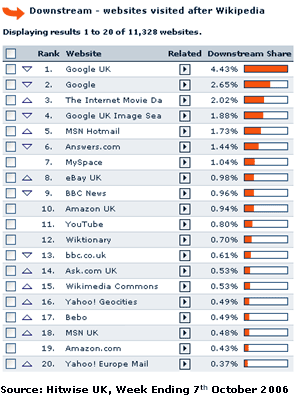High rankings for Wikipedia doesn't mean the net has been hi-jacked by teenagers
Last month Sam Vaknin, Ph.D., wrote a piece explaining how he felt Google's ranking had changed over the last year, and how "the more incoming links from MySpace a Website has - the higher it is placed in the search results"
Titled "Google-Wikipedia-MySpace - How Teenagers Hijacked the Internet", his complaint is that Google, Wikipedia and MySpace form what he calls "a pernicious feedback loop", distorting the natural order of search engine results in favour of content made and used by younger internet users, at the expense of more established sources of information.
Whilst seeming to base his piece on her research, Vaknin seems to have somewhat distorted Heather Hopkin'S original figures to reach his conclusions. In his piece he states that:
Wikipedia gets 54% of its traffic from Google search results. The majority of Wikipedia visitors then proceed to MySpace or Blogspot, both of which use Google as their search service.
However the graph on Heather's post on the topic only shows that 1.04% of Wikipedia's downstream traffic goes to MySpace (the #7 downstream destination), and doesn't mention Blogger at all - I wasn't clear therefore where he had actually sourced the figures to back his assertion.

Where I particularly find Vaknin's argument to be misplaced is the way he describes the impact of this unholy triumvirate. His argument is that Google has allowed Wikipedia to displace:
"sources of veritable information such as universities, government institutions, the home pages of recognized experts, the online full-text content of peer-reviewed professional and scholarly publications, real encyclopedias (such as the Encarta), and so on."
He makes this assertion on the basis of monitoring 154 keywords on Google "diligently" since 1999. Whilst I don't disagree that Wikipedia enjoys high rankings on Google, I would certainly argue with how much of a problem that is.
Wikipedia is very good at what it does - which is providing quick one page encyclopedical style summaries on a particular subject, which give an overview on a topic. They get linked to a lot because they are handy. It seems to me therefore that they are on the whole perfectly good results for general keyword searches.
If Sam Vaknin is really expecting to find "peer-reviewed and scholarly" publications from typing in a couple of keywords into Google, perhaps instead of blaming teenagers for interfering, he should consider refining his research approach. Or maybe giving Google Scholar a run-out, which "provides a search of scholarly literature across many disciplines and sources, including theses, books, abstracts and articles"
Unfortunately Sam Vaknin doesn't give a list of the keywords he is checking, or even an idea of the kind of sector of keywords he is checking. That makes it difficult for anyone to verify that MySpace is the dominant factor in the search results he is seeing. And of course, if he is using Google's personalised search, and keeps clicking on the Wikipedia links to check if the articles are only stubs (he says 38 of his keywords have a Wikipedia stup ranked #1), then he'll be artificially boosting the sites ranking in the search engine results he gets to see anyway.
Digging around, twopointtouch suggested that there was a bit of history between Vaknin and Wikipedia itself, so perhaps there is a pre-meditated motivation for some of his assertions. And of course, it is difficult to say how this will all pan out now that the teenage locusts are apparently deserting MySpace for somewhere quieter and cooler.